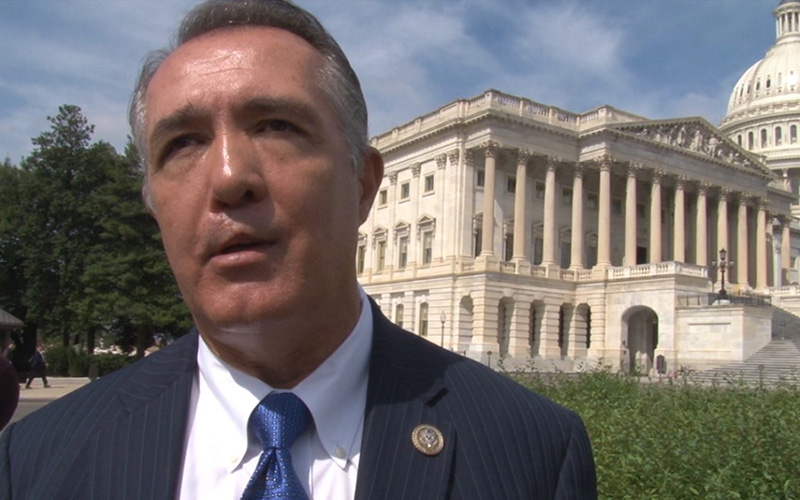WASHINGTON – The House voted along party lines Tuesday to approve Rep. Trent Franks’ bill that bans abortions after 20 weeks of pregnancy except in cases of rape, incest or threats to the life of the mother.
The Glendale Republican said his Pain-Capable Unborn Child Protection Act addresses what he called the “greatest and most insidious human rights atrocity in the United States today.”
But critics say the bill’s claim that fetuses feel pain is based on bad science, and call the measure an unconstitutional attempt, repeatedly stricken down by courts, to restrict abortion rights.
Passage had been expected in the House, which passed the bill twice before only to see the measure die in the Senate in the face of Democratic opposition.
Unlike previous years, however, the president this year said he will sign the bill if it reaches his desk and one pro-choice advocate said it bears watching in the Senate, where the Republican majority is in need of a legislative victory after repeatedly failing to repeal Obamacare.
“We’re not sure what (Senate Majority Leader) Mitch McConnell will do with it, but we’re hearing he’ll bring it to the floor,” said NARAL spokeswoman Kaylie Hanson Long. “We expect that because he really needs a win, he may fight harder to pass this, which of course is to the detriment of women and families.”
The bill passed the House 237-189 Tuesday, with just three Democrats voting for it and two Republicans voting against it. Arizona lawmakers voted with their parties on the bill.
Franks asked colleagues to support the bill as “humane Americans” and put a stop to what he called “the atrocity of late-term abortion on demand.”
“We have given these little babies less legal protection from unnecessary cruelty than the protection we have given farm animals,” Franks said on the floor of the House.
Supporters cited examples of infants born at 20 weeks who have survived, and point to medical literature they say shows that fetuses at that stage of development can feel pain – a statement that Democrats said is rejected by most researchers and medical groups.
The bill’s backers also noted that the U.S. is one of only a handful of countries – along with North Korea and China, among others – that allow abortions after 20 weeks. That argument was echoed in a letter from the Office of Management and Budget expressing the administration’s support for the bill.
-Cronkite News video by Bailey Vogt
“The United States is currently out of the mainstream in the family of nations, in which only seven out of 198 nations allow elective abortions after 20 weeks of pregnancy,” the letter said. “America’s children deserve the stronger protections that H.R. 36 would advance.”
That position encouraged supporters.
“There is a new leader who lives in the White House and he is deeply committed to protecting the least of these our little brother and sisters,” Franks said.
But opponents say that even if the law is passed, it will run afoul of the Supreme Court’s Roe v. Wade decision in 1973 that recognized a woman’s right to an abortion. Similar state laws, including one in Arizona, have been struck down by courts as unconstitutional.
Democrats blasted the bill that they said would hurt the small number of women who learn after five months that their fetus has medical complications that are likely fatal and who seen an abortion. They called it the latest attempt to eat away at abortion rights,
“When abortion is banned it does not go away,” said Rep. Suzanne Bonamici, D-Oregon. “It drives women to unsafe back alleys and to dangerous self-induced abortions. We must stop efforts to stand between women and their health care providers.”
Others expressed anger that the bill had been brought to the floor without hearings, a move to gain political points when Congress has more important work to do, they said.
“Yesterday, we had a man in Las Vegas with guns that could shoot… and kill 59 people and wound 500,” said Rep. Steve Cohen, D-Tennessee. “But do they talk about changing the Second Amendment? Do they talk about protecting Americans from that type of violence? No.”
“The bottom line is this bill is an unconstitutional attack on women’s rights and attack on the constitution,” Cohen said.
Long agreed that the bill is “not something the Republican Party should be wasting its time on.”
“They should be focusing on the real issues like anti-gun violence, like relief for Puerto Rico, like job creation – everything else this country really needs to have addressed, instead of ideological abortion bans that only put women’s health in danger,” she said.
But Franks said this is an important bill.
“It’s a test of our basic humanity and who we are as a human family,” said Franks, who said it is now “time for the Senate to take a stand.”
Despite’s Long’s concerns about how the Senate will act, a spokeswoman for the pro-life Susan B. Anthony List said the organization is not taking a Senate vote as a given.
“The big hurdle for us is going to be in the Senate, where we don’t have quite enough of a pro-life majority to reach the 60-vote threshold,” said Mallory Quigley, the spokeswoman. “But this bill did receive … support in 2015 from Democratic senators.”
-Cronkite News reporter Bailey Vogt contributed to this report.
